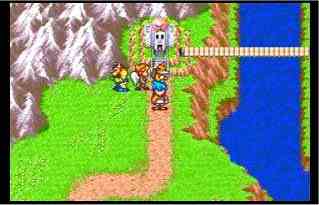Brins Reviews Things |
 For every possible angle on things that Brins can think of
For every possible angle on things that Brins can think of
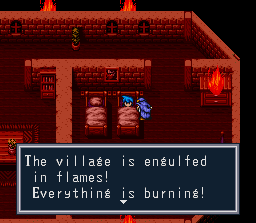
I bought this game from this website called 'eBay' (you've probably heard of it) about two years ago, although it doesn't feel that long ago. No matter. After two years of not touching it, I felt like playing it again. So, let's get onto a very idiosyncratic review.
Only, let's not. You see, Breath of Fire, if my memory's working better than usual, is in fact the first 'RPG', or Role-Playing Game, which I've reviewed. Such games put you in the role of somebody, who you should - in theory - actually be, as far as the games are concerned.* Now, these RPGs are one of the absolute weirdest to convey, review, or indeed understand under any kind of common bubble. With these games, it's astonishing as to just how many different ways of appreciating/hating them there are. Somebody who loves one of these games can positively hate another, almost identical one, just because it somehow doesn't click with them the same.
Where I'm leading up to with this is that I don't really think you can review Breath of Fire properly, to satisfy every possible taste, at least without dedicating some five years to studying it and writing a 500 page book on it. And even then, someone will come along and have another side of the story. From a very early age, I've grown up with RPGs to love them for completely different reasons from everyone else. Since I threw these games all over the place with my imagination, I had more fun just wandering around and 'levelling up' in tune to my own story than anything else.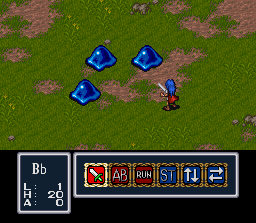
Did you understand any of that? Don't worry. Maybe the review will help.
So, as you can see in the image above, you have blue hair, and it's time to escape from a house/village which has decided to go on fire. After a nice, simple flow of events, this game kicks you out of happy-story mode and, in the traditional fashion with these old SNES RPGs, decides to let you wander the world for a while; fighting against and getting beaten by creatures which are considerably stronger than yourself; and asking you take up that classic quest of waiting near a town, barely escaping one battle, and finding a place to get better inside said town. After fighting this impregnable slime-type-thing for a while, you'll accrue enough 'experience points' to be a better fighter than you were before! Hurray! It only took five battles. Now, fight several hundred more before the boss of this castle, or you will die.
I always loved wandering around in my mind and getting pointlessly stronger in these games, so that's music to my ears (kind of)! If you ask me, when it comes to not enjoying this kind of game, I think it's because the player isn't playing the game in his mind, but rather with the controller. If you, em, well, yes, know what I mean. You don't, do you?
However, I think it's why you might have needed to grow up playing old, SNES, Japanese games to have your imagination in the right place for these games. Levelling up, I'm sure, IS the most boring thing in the world if your mind isn't somewhere else. Imagining is fun, however! I wrote a book years ago thanks to my imagination/these old games, so it just goes to show. Yes, it was terrible. 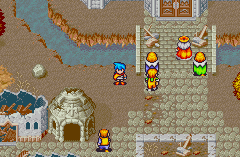
There's the castle up where that door is, as you can see. That's a king standing in front of it, as you can see. And as you can also see, our plucky hero (you) is facing the opposite direction, but he really means to go inside to walk inbetween a bunch of maze-like walls, and eventually meet a giant frog which, despite being right at the start of the game, I prefer to find my way to Level 12 before saying hello to. Being an RPG, you must fight this frog, of course.
Picture taken from GameBoy Advance version, I assume (because it looks strange)
So, you can rest assured that you will be fighting anybody/thing who/which doesn't like you from within a wonderfully pleasant battling system. After walking around in a dungeon/on top of the world for a while, the screen will look unusual, and our hero (YOU) will find his (YOUR) self facing something which doesn't like him. Something must be done at once!! So, don't worry. Press the A button, then press it again, and our hero (yes, YOU) will do something to cause pain to this enemy! However, what if the enemy is not defeated?! Then the enemy will attack you! And then, well, assuming you're alive, you must begin the process again! Or press another button before selecting 'A', in order to use an item. Or, indeed, to run away. This all changes when you make some friends, as you will have to press buttons to tell them what they might like to do, as well. That was a lot to take in, wasn't it? They say these modern games are confusing! Well, I like this system, and I can't explain why. So, well, I suppose I won't.
I think I've done a better job than I'd thought of making a review which will make people who hate these kinds of games hate this one, while appealing it to those who I think would like it. While you might not think it, I didn't mean to sound negative in this review, however much it might do. Still...
There's one thing which c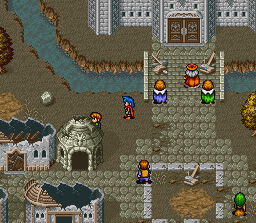 uts the RPG (or, these days, just flat-out video game) line in two, and that's plots. Most games have a plot of some form, such as 'Super Mario Bros.', in which you must stop an evil person as a plumber called Mario. Well, the reason plots cause a lot of fuss is because a common argument is that a game must have a 'good' plot; of course, the age-old problem is that defining 'good' is pretty much a subjective thing, I'd say. Can you really say there's such a thing as an inherently 'good' plot? Plots can work wonders in their field, but there's really no 'perennial' plot, is there? A serious game, with a serious plot, really can't hope to perform well when scaled as a comedy, for an extremely general example. So too, Breath of Fire's plot would be thrown into the 'let us save this cliched world' vault by many, but my imagination's always shone past these plot generalisations when it comes to games. Do what you will with Breath of Fire's plot in your mind, and you can't be disappointed. Anyway, as expressed before, the game prefers to encourage the improving of levels and attacking things than to force you to worry too much about the plot, so it's best not to worry too much about it.
uts the RPG (or, these days, just flat-out video game) line in two, and that's plots. Most games have a plot of some form, such as 'Super Mario Bros.', in which you must stop an evil person as a plumber called Mario. Well, the reason plots cause a lot of fuss is because a common argument is that a game must have a 'good' plot; of course, the age-old problem is that defining 'good' is pretty much a subjective thing, I'd say. Can you really say there's such a thing as an inherently 'good' plot? Plots can work wonders in their field, but there's really no 'perennial' plot, is there? A serious game, with a serious plot, really can't hope to perform well when scaled as a comedy, for an extremely general example. So too, Breath of Fire's plot would be thrown into the 'let us save this cliched world' vault by many, but my imagination's always shone past these plot generalisations when it comes to games. Do what you will with Breath of Fire's plot in your mind, and you can't be disappointed. Anyway, as expressed before, the game prefers to encourage the improving of levels and attacking things than to force you to worry too much about the plot, so it's best not to worry too much about it.
As is the style with my reviews, and more-so for this one, I don't mean to criticise or praise any aspect of the game. How I get through reviews doing this, I just don't know. But I like to think that I do. If you came hoping to find out more about Breath of Fire, I'm sorry, but at least there are some pictures to look at. Also, an appendix is coming up, carrying on from something said much earlier on!
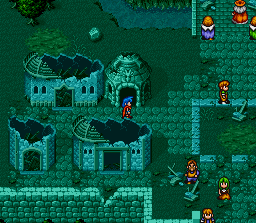
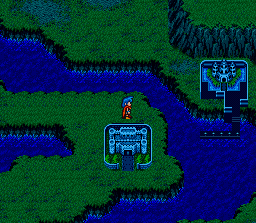
*: (Hence the (seemingly) now-unpopular RPG concept of your 'mute hero', i.e. one who never speaks. Why? Because they're you, and it wouldn't make much sense for the game to force words in your mouth. In Breath of Fire, you happen to have blue hair, and you'll not find yourself speaking much. I believe the main character says approximately ten words over the course of the game, or something along those lines. While many detest and can't get their heads around having to play an RPG where the main character never speaks, and hence never 'develops', this isn't a problem if you want to be the hero. That's convenient, since it ties with my theory that the kind of person who enjoys these games is the one who puts their imagination to work with them. Golden Sun revived this 'you are the hero' idea a while ago, but I don't think all those fancy-dancy 3D ones [which I never play] agree with such a resurrection, which is ironic, since resurrection is the kind of word that these games are quite fond of.)
Brins would appreciate it if you didn't swear in your comments
An old SNES game, featuring a pink person called Kirby as the main character. A very unique game, it excited me when it first came out because it hosted a big bunch of games within a game; eight, not including the secret bonus one. That's a lot of games!
Thing is, to the adult/modern eye, I guess they're rather short and lack any kind of story.
However, the wondering eye sees wonder in every game, fun, excitement, many special abilities.
Very strange, very melifluously ethereal music here.
There are two games which are really very small minigames. One challenges your finger to press a button at appropriate times, the other is a convenient reactions-builder. If you wish to improve your ability to react to events happening in anything, including real life, play Samurai Kirby, where the button must be pressed upon the signal! A timer is provided! So, Kirby's Fun Pak gives you the added optional feature of allowing you to have better reactions by practicing this game. Very useful!
Hand-eye-co-ordination in the other little mini-game, as well! Practice that! Press the button when the meter/pendulum/two-discs hit the best part! Yeah! Another bonus!
However, it might be viewed that the rest of the games harbour far too small a difficulty! Lives don't mean much, since it's the old thing with losing them all not forcing you to lose the game instantly. You just start the level again, saved data in tact. Well, if you don't know much about platform games, a bonus! Learn how to play! Yes!
There's even a chance to improve your ability to duel with a sword.
Kirby's Fun Pak is colourful, enchanting, and very interesting if the things I've said sound fun, intriguing, wonderful, or at least nice. However, everyone's cup of tea is on the table over there.
Angle 1: To swallow things and jump around the place! I cannot be stopped! How boring!
Angle 2: I say! How colourful! How playful! Such nice music! I want to stroll around as Kirby!
Angle 3: I can improve my reactions and hand-eye co-ordination! Hurrah!
Angle 4: A tough game! I want to practice and get better! Yeah!
Angle 5: So many games! A fantastic experience, even though they all have the same/similar play mechanics and sprites, etc.
So, there you have it. A special Christmas review.
Brins would appreciate it if you didn't swear in your comments
The Nintendo Gamecube console was released at some point in 2001, as you may be aware, and launched alongside it was one of the most obscure console-launching titles in recent times. Rather than a Mario platform game, Nintendo decided to give Mario's brother, Luigi, a starring role in a game whose main theme consists of wandering around a mansion, trying to catch ghosts by sucking them up into a special vacuum cleaner designed for such purposes. Bear in mind there is no jump button.
I got this game for Christmas a few years ago, and actually just picked it up for the first time since then a few months ago to play it. This game has been quite forgotten by mostly everyone, and hasn't made any kind of imprint on the world of video games. There's been no sequel, Luigi hasn't been a main character in any major Nintendo game since (to my knowledge), and this game itself got quite mocked and scorned for such things as its length, the whole concept, and other things.
Now, by most reviewing standards, you might think that all this is leading up to a heroic defence of Luigi's Mansion, saving the day from some kind of small-minded mass of people who don't like it much. Well, basically, no. It might take a while for you (not to mention me!) to get used to this, but I'm taking in as many angles as I can and treating them equally. When I review something, I like to give as many people as possible a better picture for them to judge by themselves.
When it comes to this game, you see, there are those who will love it, those who will hate it, and others who will like/not-mind/be-confused-by it. I'm not going to say, "this game is good," let alone "this game is bad." Because I don't think it matches either qualilty universally; you could say it's not really worth bothering to review, since it's so obscure, but I think there's value in this as much as in anything else.
Let's split the review into several sections, targetting some of the angles I think it can be interpreted from. But before that, some pretty pictures.
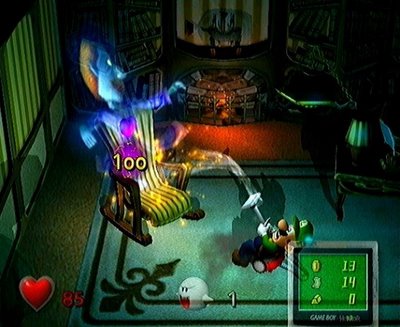
Or at least one. I can't get any more to appear in the one post. How strange...
Luigi's Mansion is a very one-track, esoteric game, in the sense that you're pretty much stumped if you can't enjoy sucking objects/ghosts with vacuum cleaners in a variety of different locations and for considerably branching purposes. You can't be picking this one up to run around and relieve stress - it's quite slow, you can't jump, and you spend most of the time performing a set sequence of operations on every enemy you encounter (aim your torch at them to freeze them, vacuum them, repeat). Puzzles exist in the form of using the vacuum cleaner on things, or perhaps sucking an object onto it to launch at another, or perhaps pressing the A button beside something. There are also times to use various elements (fire, water, and ice) on things to cause reactions, but nothing special.
In other words, many people will surely find Luigi's Mansion impossible to appreciate much. It makes no attempt to vary its format from vacuum-cleaning form, so you can't expect anything interesting to happen (that is, something completely off-track to take you by surprise. It's not going to be there).
However, there will be the people who take Luigi's Mansion for what it is and actually find enjoyment out of the whole concept. Indeed, the same could find ghost-catching quite addictive, warranting this one to be good on its own right. If you do love the whole concept of the game, then you will find there to be much variation, in the sense that your beloved concept is taken to many directions of intrigue and discovery.
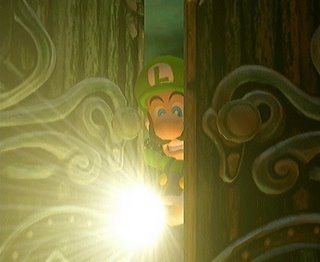
But in any case, it's still rather short. This is the point where something else surfaces which I've discovered myself.
Something of a side-part to the whole adventure is that, during the entire game, there is an unmentioned object to find and collect as many valuable objects (coins, notes, gems, pearls) as possible. They can be found by vacuuming certain objects to reveal them from within, catching certain hidden ghosts, and some other subtle things. The only thing money seems to have to do with anything is to show a picture at the end of the game, and that picture will be better depending on the money you have. It's not much of a burden to find enough to get this picture, and it's hardly a reward, so this aspect of the game would not mean much to many.
But over some months ago, I became quite enraptured in the money. This is because I started to notice that, unapparent as it seems when playing, there are fixed amounts of money revealed from all things in the game, and (with apparently only one exception) they always come in multiples of five (anything from 5, 10, 15, 20, or 25 in coins and notes respectively, but usually 5 more coins than notes where applicable). It sounds simple, but this proved that there was a maximum money amount to be found.
And it's in this that the most fun part of this whole game has been found for me: getting all that money! This game becomes so much more interesting and rewarding when you find just how difficult it can be to actually get everything out of a chest, say, before the last few coins disappear. In the harder difficulty (a secret bonus!), you have to contend with being hit and losing some precious money.
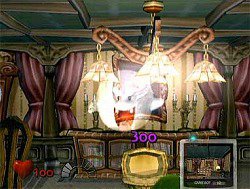
I can't describe it, but to the right kind of mind for it, this is so groovy, it must be attempted! The European version apparently contains much more money in the harder difficulty, which ever-more encourages me to get that maximum.
Of course, once the max is reached, I guess that's it. Still, you'll forever cherish the game for uncovering this secret way of enjoying it. Especially if you're European.
So, let's recap on Luigi's Mansion. It caters for the kind of person who doesn't play video games simply for a basic form, type, or experience. People like me, who have been quite brought up in a wide verse of types of game, may have the open minds to find an enjoyment in this one. However, it's respectable that many of those people and others will simply not tune into what Luigi asks you to get to grips with. I don't like football, and that's just the way it goes. So too would many not want to dance with Luigi for too long.
They say this game had an ulterior motive when it came out - it was the 'graphical showoff', made in its unique style because it was expedient to putting out an 'our console is quite excellent in terms of graphical capabilities' way. Well, I have to say that even if this is true, it's not to say that it still can't be an enjoyable game in its right. It's also not to say that it is.
The cards are on the table, and you can pick it up if you wish, but only if you'd like to. Otherwise, might want to leave them and watch someone else instead.
Angle 1: It takes an innovative concept and executes it in a way that gets quickly boring, tedious, and just doesn't work.
Angle 2: The whole idea doesn't really work at all.
Angle 3: There's fun to be had here if you enjoy vacuuming things.
Angle 4: There's a genuinely pleasant experience to be had here.
Angle 5: There isn't any effort to spice up things from the vacuum. Something else must be there.
Angle 6: To collect the money is splendiferous.
Angle 7: The mind is captured and happy at the system of catching ghosts.
Angle 8: It all feels rather dull. Most rooms feel the same as each other, and they're all small and uninspiring.
So, browse and take your pick. There's something to be had for everyone here at Brins Reviews Things. Or at least, that's the idea.
Brins would appreciate it if you didn't swear in your comments
You might have noticed that I described the first review here as a Grade 2 review. What does that mean?
At the moment it doesn't mean anything, because I only put it in because I thought I'd like to grade the reviews on some scale or other. In several minutes after the time of writing this sentence, I will have hopefully written a grade scale which you can now read.
Grade 1: A small, summary-like review. Perhaps not to be taken too heavily, since it won't be taking in all the angles of the reviewed item like I would do with longer reviews.
Grade 2: A longer review than Grade 1, and one which tries to take in many angles, but which is probably reviewing something I thought of for fun.
Grade 3: If this blog works out well, these will be the reviews I'll be aiming to do most - reviewing things I would like to review quite genuinely, and with sincerity. The many things I've been through in life that I'd like to review, and when I say 'things I've been through', come to think of it, I might just take that idea further.
So, three grades made up on the spot to give this review blog a direction. The games will begin soon.
And, oh look! I was right! I did indeed write some grade definitions in the minutes between this sentence and the sentence where I said that I would. Congrations! I know, I missed out a syllable! Yip!
Brins would appreciate it if you didn't swear in your comments
Not just any torch, but a small, plastic, yellow torch.
Before analysing this torch, let's consider the world of torches as a whole. Now, torches have been around for some time, and it could be argued that society - in general - has become a touch complacent about the use and place of torches in the modern world. Comparatively, the individual doesn't really stop on a brisk, outdoor jog to consider how much they owe to torches.
These factors compiled with respect to the yellow torch, it is time to consider these outlooks and others in our review.
Let's take the individual and society separately: now, as you will soon come to see with my reviewing ethos, I don't like to disdain or demote any point of view on a subject, as I consider there to be merit to all. Furthermore, we must remember that for any view on something to come about, any person that holds to one must surely have solid personal convictions for doing so - that is to say, they know why they couldn't care less about the torch. Those who have always loved torches can't fathom them, and vice versa.
So basically, I always give account for all views on these matters. Society has a point about torches not having a particular place in modern life - certainly, pass a Medieval person a torch and they would be overjoyed at having their own light to do with as they please. However, we now have artificial light all over the place: streetlamps, indoor lamps, Christmas decorations, computer screens; everywhere we look, there's something to light our way. While torches came into great use in days gone by, particularly for workers in dark places like tunnels, these things were invaluable to doing things efficiently. Yet, who needs torches when you can see your streets for lamps?
The individual who has gone their whole life without thinking about torches in any great deal would also have a fascinating perspective on them - having never been faced with the world of the torch, save perhaps for some brief need of one for looking in a cupboard, they present the undervalued contribution of ignorance to the great torch debate. Why should they care about torches? They've never needed them. Indeed, someone who has never used a torch will probably not think too highly of them. The issue raised with this is that if the individual doesn't care much about torches, then can that individial point of view be expanded to encapsulate the vast proportion of Western thinking on the subject? The majority of people will no doubt have heard of a torch, but owe little-to-nothing to the torch as an item of light.
These views on the torch are very interesting, and sum up at least one angle of torches. However, that's not to say there aren't more.
For a striking example, consider this: it's night-time, and you're in a supermarket; suddenly there is a power-cut - all the lights go out. There are now no lights left in the building, and everyone's pretty much stranded without being able to see a thing. What single thing can take you out of this bothersome plight with minimal difficultly? A torch? Not to put words in mouths, but it seems to be that the case would be in favour of a torch. If we consider the definition of 'torch' to mean any kind of lighting mechanism which works independently of any external influence, then yes, a torch alone can save your bacon (you don't want it going stale outside the fridge, do you?)
Similarly, what happens if you go into a dark forest late at night? A torch is useful. An unexplored mine-shaft? Again, torch useful. A volcano? A haunted mansion? Outer space? Black holes? (Though common thinking in the field of astro-physics is that utilising a torch within a black hole would be impossible [note: common astro-physics thinking also presumes that black holes actually exist]. Perhaps black holes will be considered more in-depth at a later date.) Where would we be without torches in at least some of these mundane scenarios?
We can ascertain the values of society and the individual - in general - with respect to torches, and their arguments are very sound. Nonetheless, who can deny that a torch would come in handy at the local unlit graveyard in the witching hour? Until the day when someone decides to invent something that make the universe bright all the time, a torch will always have its place in such scenarios.
In closing, I feel that I've managed to cover some fair ground in the analysis of torches, and represented both basic sides of the torch debate to the extent of giving a true and fair view of their summations.
To word the review less technically, the yellow torch works. It turns on when a small, black object on its side is moved upwards slightly. This could be viewed as being a tedious operation, but suits minor practical purposes for most people. Provided the batteries don't go flat, the little yellow torch is fine.
Brins has reviewed a torch to a Grade 2 level.
Brins would appreciate it if you didn't swear in your comments

Welcome to Brins Reviews Things, a prototype version of a reviewing blog, created by Brins of the blog that link on the name goes to. I'm Brins, by the way.
At this time, I have not announced the creation of this blog on the CICC (acronym of my main blog's title, hereafter referred to as that acronym for all accounting purposes). If you're here, you've just arrived at the beginning of what might become an interesting development, so please check back now and again for news and the reviews of Brins.
That's all that's to be said for this induction process, at least for the timebeing. Would all students please leave the lecture hall via the undesignated exit, and be th- huh?! Wh-What?! NO!! Sto-STOP!! Leave the chairs where they - th- my eyes!!
Only joking! Look, my eyes are fine!
Brins would appreciate it if you didn't swear in your comments
